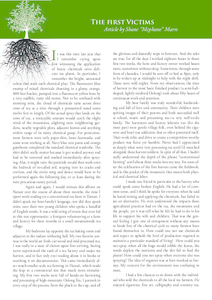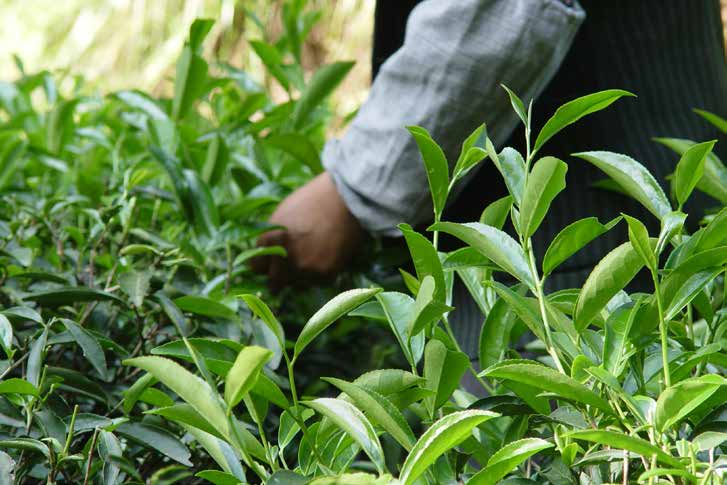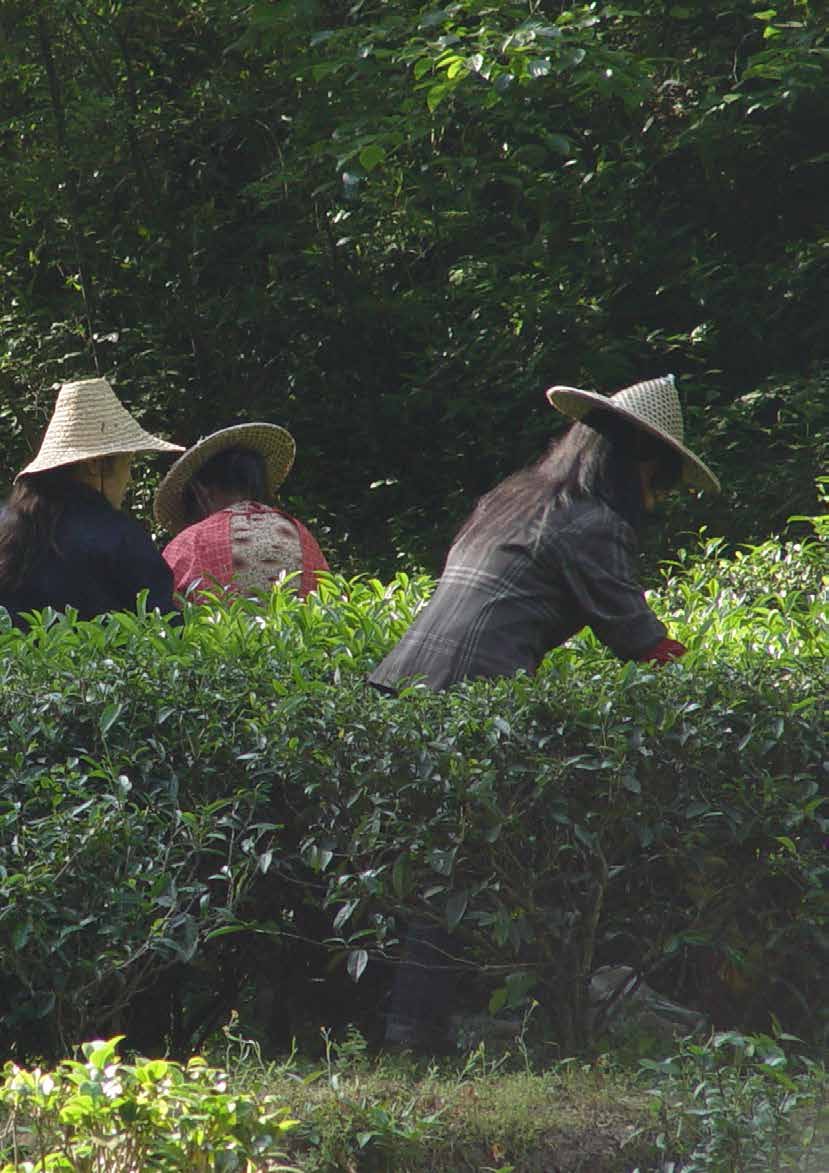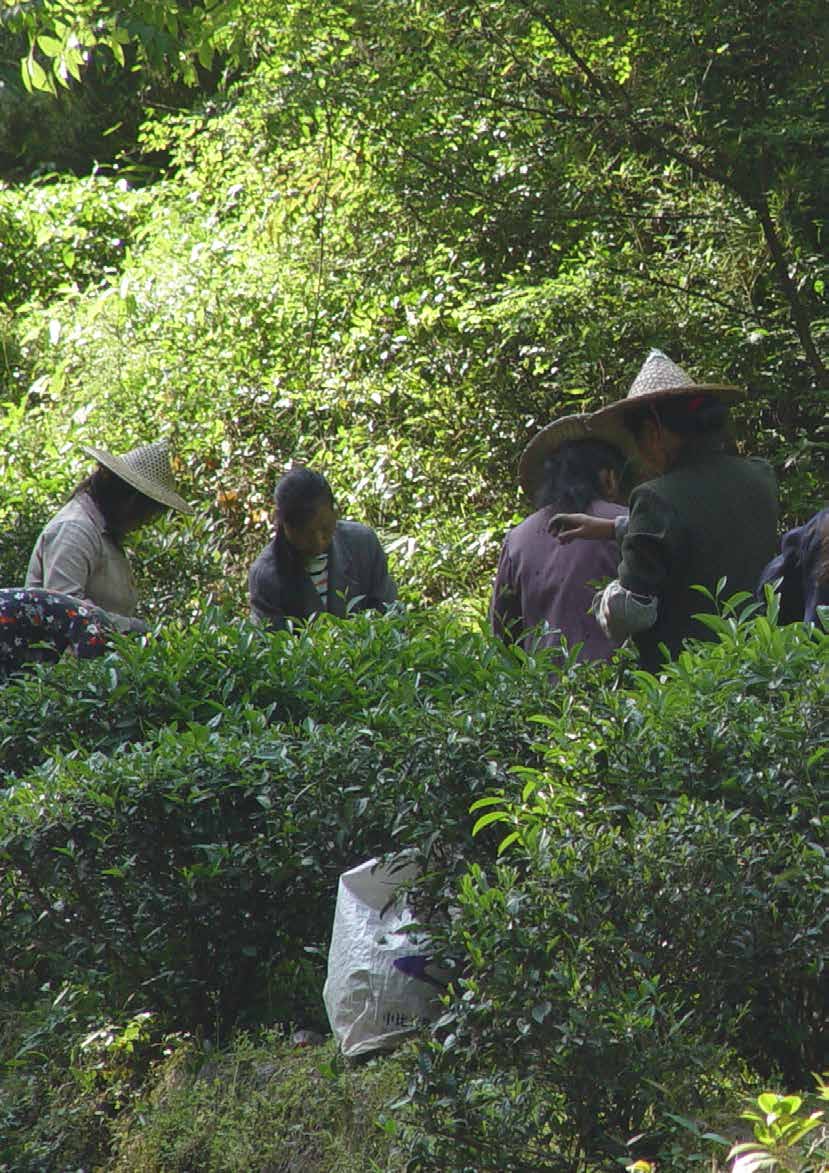
 |
|
It was this time last year that I remember crying upon first witnessing the application of heavy chemicals onto delicate tea plants. In particular, I remember the bright, unnatural colors that stain such chemical play: The fluorescent blue swamp of mixed chemicals churning in a glossy, orange, 400-liter bucket, pumped into a fluorescent yellow hose by a very audible, rusty old motor. Not to be confused with morning mist, the cloud of chemicals rains across three rows of tea at a time through a pressurized wand some twelve feet in length. Of the actual spray that lands on the rows of tea, a noticeable amount would catch the slight wind of the mountains, alighting onto neighboring gardens, nearby vegetable plots, adjacent homes and anything within range of its misty chemical grasp. For protection, most farmers wore only paper-thin, loose facemasks, and some wore nothing at all. Navy blue rain pants and orange gumboots completed the standard chemical wardrobe. The shirt didn't really matter because it got soaked anyway and had to be removed and washed immediately after spraying. Alas, it might rain; the pesticide would then wash onto the bedrock of so-called soil, seeping into its cracks and crevices, and the entire song and dance would have to be performed again the following day, or at least during the next precarious sunny period.

Again and again, I would witness this affront on Nature over the course of about three months: the time I spent work-trading on a conventional tea farm in Taiwan. I didn't speak my host-family's language, nor did they speak mine, save their two young children who spoke a handful of English words. It was a wild string of events that even led to this rare opportunity: a foreigner volunteering at a farm and factory for three months in a small mountainside tea village.
My bedroom lay opposite the tea baking room and adjacent to the indoor withering hall. My two favorite aromas in the world are fresh-cut wood and mid-processed tea. I was really in a state of elation upon first arriving, having never experienced the rush of a tea factory and major tea harvest, and in fact only ever reading about it in books or watching it on documentaries. This came immediately after much smaller scale tea farming in Hawaii, which made the leap to a commercial size that much more stimulating. My first two weeks were full of hands-on harvesting and processing of high-mountain Oolong Tea. I partook in every step of the process, from the pluck to the cup, and all the glorious and dastardly steps in between. And the tales are true, for all the days I worked eighteen hours in those first two weeks, the farm and factory owner worked hours more, sometimes without sleep. Sometimes, through some form of charades, I would be sent off to bed at 8pm, only to be woken up at midnight to help with the night shift. Those were wild nights. From my observations, the time of harvest to the most basic finished product (a semi-ballshaped, lightly oxidized Oolong) took about fifty hours of continuous work and attention.

My host family was truly wonderful; hardworking and full of love and community. Their children were spitting images of their parents and both succeeded well at school, music and processing tea - a very well-to-do family. The harvesters and factory laborers too (for the most part) were gentle village folk, even behind the cigarette and betel nut addiction that so often presented itself. Their work ethic and drive to create a competition-worthy product was fierce yet humble. Never had I appreciated so deeply what went into processing tea until I'd marched alongside these harvest soldiers. In spite of all that, I hadn't really understood the depth of the phrase "conventional farming" until about three weeks into my stay. For soon after the celebration of the first harvest came the fieldwork, and in this pocket of the mountain, that meant both physical and chemical labor. I made one friend in particular at the factory who could speak some broken English. He had a lot of common sense, and I think he spoke for everyone when he said he hated mixing and applying the chemicals, but failed to see an alternative. He even understood the impacts these agricultural practices had on the tea, the mountains and the people, yet it was still what he felt he had to do in his life to support his wife and children. That was the general feeling I got: one of entrapment without any means to break free of the chemical cycle so many farmers have found themselves in. How could one not use chemicals and expect to uphold the level of production required to maintain a particular standard of living? How could you not spray when all the bugs would nibble the leaves, the weeds deplete the nutrients and the dirt fail to feed the plants? How could you not spray when everyone else was spraying? The idea of organics was at best mocked as fantasy. My concern for the environment was confusing to most.
I had a few chances to sit down with the individual who sold the chemicals to all the local tea farmers. He enjoyed cigarettes, fine art, calligraphy and crummy tea. He had a snobby air about him, but he too had a family. I was blessed to eat dinner with them one evening and none of them seemed negatively intentioned towards humans or the Earth. Like any family, they had their strong points and dysfunctions, but nothing that suggested an evil intention behind their line of business. They were honored to have me there and I was honored to be there. There was no one to point my finger at. All of my searching for someone to blame came to no avail. It wasn't the farmer's fault, the local retailer or the entity that is the chemical industry. Surely someone could be held accountable for all the victims involved (like the consumers) couldn't they?
On the deepest level, we are all to blame. The only answer to the question of what is wrong with the world, as the film suggests, is "I am". And I am the solution as well!
The experience was terribly challenging at times. On the one hand, I was gifted this amazing and rare opportunity to learn about an aspect of Nature I dearly love through hands-on experience and by living with a caring family in a small village; and on the other hand I was faced with farming practices that were in direct conflict with my love of tea as a gift from Nature. Searching in the dark for the true light of tea, I finally reached out for help. And that ultimately led me to the Tea Sage Hut. How can I not be forever grateful for this conventional tea farming experience, which while trying at times, ultimately led me to a place that I now consider home; a place where tea and spirit, Cha and Dao, merge; a place that supports environmental stewardship and organic farming practices; a place where service is of the first order; a place where leaves, water, and wisdom can be shared without any personal profit; a place where laughter is thoroughly exercised; a place where connection is made possible with ourselves, with others, and with Great Nature; a place of community, Dharma, mastery, spirituality, love, healing, movie nights and crazy Zen antics. Who knew such a place existed! I surely wouldn't have had it not been for my chemical romance. During my first visit to the Tea Sage Hut this time last year, I would learn from my then-to-be teacher that it was "the farmers who were the first victims."
It made so much sense, too. They're out there on the frontline; chemical warfare if you will, war against pests and weeds and nutrient deprived soil. Armed with - cides, petty facemasks and rubber boots. And why are they spraying all these - cides? Because everyone is spraying. And why is everyone spraying? For a web of reasons too interwoven to discuss in detail here, but essentially out of a desire for profit with the prospect of bountiful crops that apparently only chemicals can offer. Not to mention a lack of education on the effects of such agriculture practices, or an education on alternative methods of agriculture.

And so it is: the farmers really are the first victims. They have the most direct contact with these dangerous chemicals and moreover, lack an education and motivation to pursue more sustainable, ecologically driven farming practices, which with they have long been out of touch. They are led to believe that they are stuck in a chemical cycle, which they can't be rescued from, and it's that very belief system which further ingrains and perpetuates that cycle on a commercial scale. But it does no good to complain. My teacher says we must move forward through inclusion, not exclusion, through education and positivity, not negativity.
This is why it's so important that all of you are Global Tea Hut members. There is great truth in the fact that you, as a consumer, are actively supporting the organic shift in Taiwan because the farmers who donate their tea to us are organic and environmentally conscious people. You are promoting clean and sustainable tea farming in Taiwan. Consumers hold the power to affect change because the farmers hear loud and clear where there is demand and as it increases so do the number of farmers who want to meet and supply that demand!
Every living creature in all the ecologies that are created as a result of organic tea farming (including the farmers!), and every one of us here at the Tea Sage Hut, thanks you from the bottom of our bowl for supporting Taiwan's movement in becoming a greener country. You are making a difference in the lives of the first victims. A thousand, thousand cups of tea to each and every one of you...
